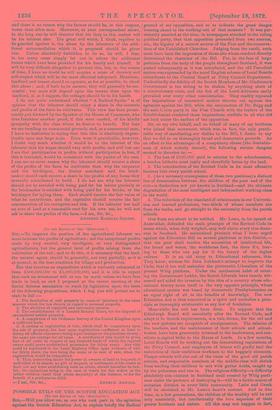[TO THE EDITOR OF THE "SPECTATOR."]
Sin,—To improve the position of the agricultural labourer we must increase the profits of agriculture ; not the exceptional profits made by very careful, very intelligent, or very distinguished agriculturists, but the general level of profits arising from the- cultivation of the soil ; and to do this, it is necessary that the land, the natural agent, should be generally, not very partially, as it is at present, in the best condition for tillage and production.
But this involves an expenditure which is variously estimated at from £500,000,000 to £1,000,000,000, and it is idle to expect that such an investment will or can be made unless we have free trade in land, an end I proposed at the recent meeting of the Social Science association to reach by legislation upon the basis of the following propositions, which I beg you will permit me to state in full :-
1. The devolution of real property in cases of intestacy in the same manner which the law directs in regard to personal property.
2. The abolition of copyhold and customary tenures.
3. The establishment of a Landed Estates' Court, for the disposal of encumbered settled property.
4. A completion of the Ordnance Survey of the United Kingdom upon a sufficient scale.
5. A system of registration of title, which shall be compulsory upon the sale of property, the fees upon registration—sufficient at least to defray all official expenses—being a per-centage on the purchase-money ; the same per-centage for all sums. A certificate of title would be given free of all costs in respect of any freehold lands of which the reputed owner could prove undisturbed possession for thirty years. Any title could be registered in the Land Registry Office upon evidence of title for thirty years, the fees being the same as in case of sale, when the registration would be compulsory.
6. That, preserving intact the power of owners of land to bequeath it undivided or in shares, no gift, or bequest, or settlement of life estate in land, nor any trust establishing such an estate, should hereafter be law- ful; the exceptions being in the case of trusts for the widow or the infant children (until they attain majority) of the testator, or for the benefit of a posthumous child.


































 Previous page
Previous page